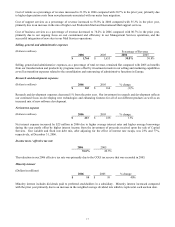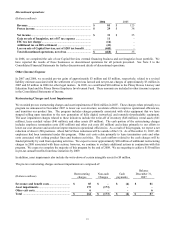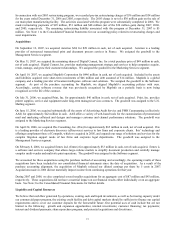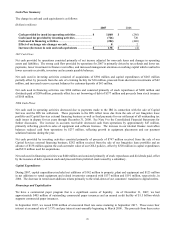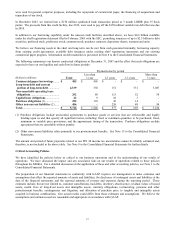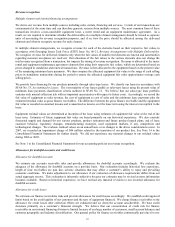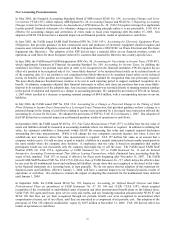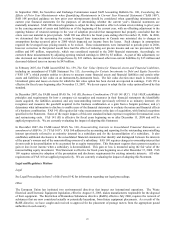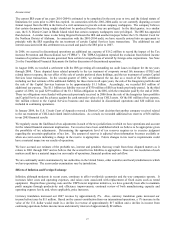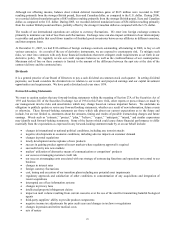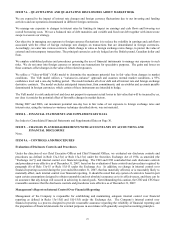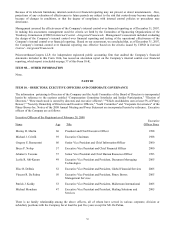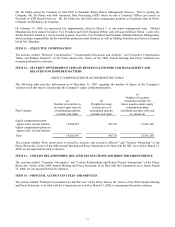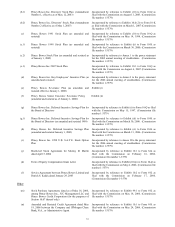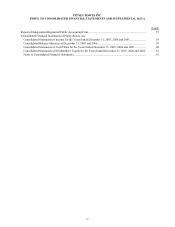Pitney Bowes 2007 Annual Report Download - page 45
Download and view the complete annual report
Please find page 45 of the 2007 Pitney Bowes annual report below. You can navigate through the pages in the report by either clicking on the pages listed below, or by using the keyword search tool below to find specific information within the annual report.27
Income taxes
The current IRS exam of tax years 2001-2004 is estimated to be completed in the next year or two, and the federal statute of
limitations for years prior to 2001 has expired. In connection with the 2001-2004 audit, we are currently disputing a recent
formal request from the IRS in the form of a civil summons to provide certain company workpapers. The company believes
that certain documents being sought should not be produced because they are privileged. In the third quarter, in a similar
case, the U.S. District Court in Rhode Island ruled that certain company workpapers were privileged. The IRS has appealed
that decision. A similar issue is also being litigated between the IRS and another taxpayer before the U.S. District Court for
the Northern District of Alabama. In connection with the 2001-2004 audit, we have recently entered into an agreement in
principle with the IRS regarding the tax treatment of certain Capital Services lease transactions. The additional tax and
interest associated with this settlement was accrued and paid to the IRS prior to 2007.
In 2006, we accrued in discontinued operations an additional tax expense of $16.2 million to record the impact of the Tax
Increase Prevention and Reconciliation Act (“TIPRA”). The TIPRA legislation repealed the exclusion from federal income
taxation of a portion of the income generated from certain leveraged leases of aircraft by foreign sales corporations. See Note
2 to the Consolidated Financial Statements for further discussion of discontinued operations.
In August 2006, we reached a settlement with the IRS governing all outstanding tax audit issues in dispute for the tax years
through 2000. These disputed items related primarily to the tax treatment of corporate owned life insurance (COLI) and
related interest expense, the tax effect of the sale of certain preferred share holdings, and the tax treatment of certain Capital
Services lease transactions. In the second quarter of 2006, we estimated the tax due as a result of the IRS settlement
including our best estimate of the additional liability for these items in all open years, the sale of the Imagistics portfolio and
the sale of the Capital Services business to be approximately $1.1 billion. Accordingly, we recorded $61 million of
additional tax expense. The $1.1 billion tax liability was net of $330 million of IRS tax bonds previously posted. In the third
quarter of 2006, we paid $239 million of the $1.1 billion obligation to the IRS, with the remainder paid by the end of 2006.
These tax obligations were funded with proceeds previously received in 2006 from the sale of the Imagistics lease portfolio
and Capital Services and the advance against the cash surrender value of our COLI assets. Of the $61 million of tax expense,
$41 million related to the Capital Services business and was included in discontinued operations and $20 million was
included in continuing operations.
In January 2006, the U.S. Circuit Court of Appeals reversed a District Court decision that another company received related
to the tax treatment of COLI and related interest deductions. As a result, we recorded additional tax reserves of $56 million
in our 2005 financial results.
We regularly assess the likelihood of tax adjustments in each of the tax jurisdictions in which we have operations and account
for the related financial statement implications. Tax reserves have been established which we believe to be appropriate given
the possibility of tax adjustments. Determining the appropriate level of tax reserves requires us to exercise judgment
regarding the uncertain application of tax law. The amount of reserves is adjusted when information becomes available or
when an event occurs indicating a change in the reserve is appropriate. Future changes in tax reserve requirements could
have a material impact on our results of operations.
We have accrued our estimate of the probable tax, interest and penalties that may result from these disputed matters as it
relates to 2001 through 2007 and we believe that the accrual for tax liabilities is appropriate. However, the resolution of such
matters could have a material impact on our results of operations, financial position and cash flow.
We are continually under examination by tax authorities in the United States, other countries and local jurisdictions in which
we have operations. The years under examination vary by jurisdiction.
Effects of Inflation and Foreign Exchange
Inflation, although moderate in recent years, continues to affect worldwide economies and the way companies operate. It
increases labor costs and operating expenses, and raises costs associated with replacement of fixed assets such as rental
equipment. Despite these growing costs and the USPS meter migration initiatives, we have generally been able to maintain
profit margins through productivity and efficiency improvements, continual review of both manufacturing capacity and
operating expense levels, and, where applicable, price increases.
Currency translation increased our 2007 revenue by approximately 2%. Also, currency translation gains increased our
income before taxes by $11 million. Based on the current contribution from our international operations, a 1% increase in the
value of the U.S. dollar would result in a decline in revenue of approximately $17 million and a decline in income from
continuing operations before income taxes and minority interest of approximately $2 million.


